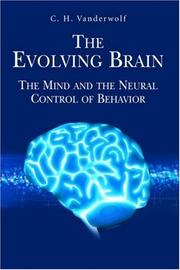| Listing 1 - 6 of 6 |
Sort by
|
Book
ISBN: 128085247X 9786610852475 0387342303 Year: 2007 Publisher: New York, NY : Springer,
Abstract | Keywords | Export | Availability | Bookmark
 Loading...
Loading...Choose an application
- Reference Manager
- EndNote
- RefWorks (Direct export to RefWorks)
Present-day behavioral and cognitive neuroscience is based on the idea that the conventional philosophical theory of the mind provides a reliable guide to the functional organization of the brain. Consequently, much effort has been expended in a search for the neural basis of such psychological categories as memory, attention, emotion, motivation, and perception. The Evolving Brain: The Mind and the Neural Control of Behavior argues that (a) conventional psychological concepts originate from the philosophical speculations of ancient Greek philosophers, especially Plato and Aristotle; (b) there is serious doubt that these ancient philosophical analyses provide a reliable guide to the understanding of the human mind, human behavior, or the organization of the brain; and (c) that modern scientific studies of animal behavior provide a better guide to the study of the functional organization of the brain than is provided by conventional psychological concepts. C. H. Vanderwolf, Ph.D., DSC., is a Professor Emeritus in the Department of Psychology and Graduate Program in Neuroscience at the University of Western Ontario, London, Ontario, Canada.
Brain. --- Neuropsychology. --- Cognitive neuroscience. --- Neurophysiology --- Psychophysiology --- Cognitive neuropsychology --- Cognitive science --- Neuropsychology --- Cerebrum --- Mind --- Central nervous system --- Head --- Neurosciences. --- Psychology, clinical. --- Consciousness. --- Anthropology. --- Philosophy of mind. --- Cognitive Psychology. --- Philosophy of Mind. --- Mind, Philosophy of --- Mind, Theory of --- Theory of mind --- Philosophy --- Metaphysics --- Philosophical anthropology --- Human beings --- Apperception --- Mind and body --- Perception --- Psychology --- Spirit --- Self --- Neural sciences --- Neurological sciences --- Neuroscience --- Medical sciences --- Nervous system --- Cognitive psychology. --- Psychology, Cognitive --- Primitive societies --- Social sciences

ISBN: 9780387342290 9780387342306 038734229X 1441941703 9786610852475 128085247X 0387342303 Year: 2007 Publisher: New York Springer
Abstract | Keywords | Export | Availability | Bookmark
 Loading...
Loading...Choose an application
- Reference Manager
- EndNote
- RefWorks (Direct export to RefWorks)
Present-day behavioral and cognitive neuroscience is based on the idea that the conventional philosophical theory of the mind provides a reliable guide to the functional organization of the brain. Consequently, much effort has been expended in a search for the neural basis of such psychological categories as memory, attention, emotion, motivation, and perception. The Evolving Brain: The Mind and the Neural Control of Behavior argues that (a) conventional psychological concepts originate from the philosophical speculations of ancient Greek philosophers, especially Plato and Aristotle; (b) there is serious doubt that these ancient philosophical analyses provide a reliable guide to the understanding of the human mind, human behavior, or the organization of the brain; and (c) that modern scientific studies of animal behavior provide a better guide to the study of the functional organization of the brain than is provided by conventional psychological concepts. C. H. Vanderwolf, Ph.D., DSC., is a Professor Emeritus in the Department of Psychology and Graduate Program in Neuroscience at the University of Western Ontario, London, Ontario, Canada.
Brain --- Cognitive neuroscience --- Neuropsychology --- Neurophysiology --- Psychophysiology --- Cognitive neuropsychology --- Cognitive science --- Cerebrum --- Mind --- Central nervous system --- Head
Digital
ISBN: 9780387342306 Year: 2007 Publisher: Boston, MA Springer Science + Business Media, LLC
Abstract | Keywords | Export | Availability | Bookmark
 Loading...
Loading...Choose an application
- Reference Manager
- EndNote
- RefWorks (Direct export to RefWorks)
Cognitive psychology --- Psychology --- Ethnology. Cultural anthropology --- Neuropathology --- neurologie --- cognitieve psychologie --- neuropsychologie --- persoonlijkheidsleer

ISBN: 1402073453 Year: 2003 Publisher: Boston Kluwer Academic
Abstract | Keywords | Export | Availability | Bookmark
 Loading...
Loading...Choose an application
- Reference Manager
- EndNote
- RefWorks (Direct export to RefWorks)
Book
ISBN: 9780387342306 Year: 2007 Publisher: Boston, MA Springer Science + Business Media, LLC
Abstract | Keywords | Export | Availability | Bookmark
 Loading...
Loading...Choose an application
- Reference Manager
- EndNote
- RefWorks (Direct export to RefWorks)
Present-day behavioral and cognitive neuroscience is based on the idea that the conventional philosophical theory of the mind provides a reliable guide to the functional organization of the brain. Consequently, much effort has been expended in a search for the neural basis of such psychological categories as memory, attention, emotion, motivation, and perception. The Evolving Brain: The Mind and the Neural Control of Behavior argues that (a) conventional psychological concepts originate from the philosophical speculations of ancient Greek philosophers, especially Plato and Aristotle; (b) there is serious doubt that these ancient philosophical analyses provide a reliable guide to the understanding of the human mind, human behavior, or the organization of the brain; and (c) that modern scientific studies of animal behavior provide a better guide to the study of the functional organization of the brain than is provided by conventional psychological concepts. C. H. Vanderwolf, Ph.D., DSC., is a Professor Emeritus in the Department of Psychology and Graduate Program in Neuroscience at the University of Western Ontario, London, Ontario, Canada.
Cognitive psychology --- Psychology --- Ethnology. Cultural anthropology --- Neuropathology --- neurologie --- cognitieve psychologie --- neuropsychologie --- persoonlijkheidsleer
Article
Abstract | Keywords | Export | Availability | Bookmark
 Loading...
Loading...Choose an application
- Reference Manager
- EndNote
- RefWorks (Direct export to RefWorks)
Boxes. --- Gerbil. --- Lesion. --- Lesions. --- Mongolian gerbil. --- Mongolian-gerbil. --- Time.
| Listing 1 - 6 of 6 |
Sort by
|

 Search
Search Feedback
Feedback About UniCat
About UniCat  Help
Help News
News